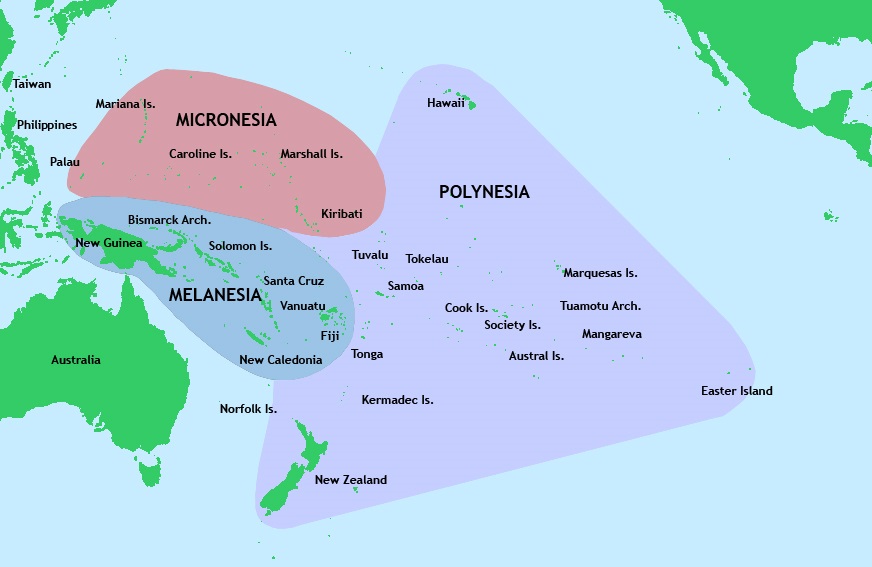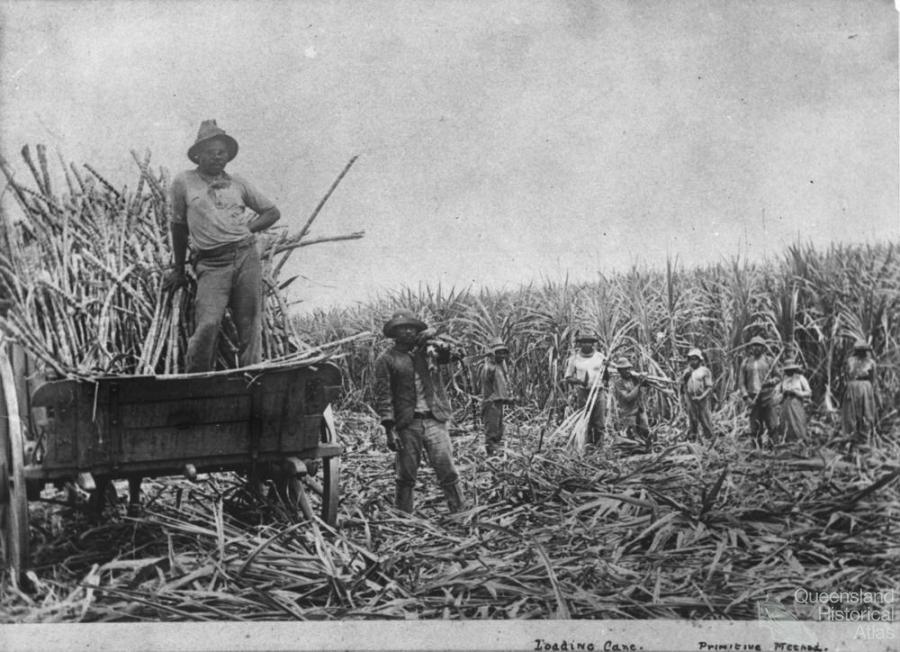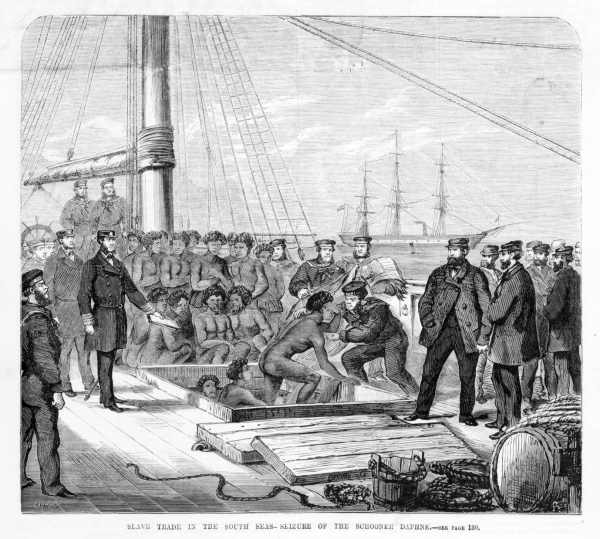
From World News Australia, "South Sea Islanders mark sugar 'slave' days," by Stefan Armbruster, on 17 August 2013 -- Vanuatu is calling for an apology over the practice known as 'blackbirding', when Pacific Islanders were used as labourers in Queensland.
Claims of the Queensland government stealing South Sea Islander wages and calls for an apology are being made on the 150th anniversary of the first labourers arriving in Queensland.
Descendants of the tens of thousands of workers marking the notorious episode in Australian history with events across Queensland.
The process known as "blackbirding" saw islanders sometimes forcibly taken to work in the agricultural industry in what is often described as a slave trade.

Stefan Armbruster reports: This is the little known story of exploited foreign workers, told by Auntie Joyce Lea.
"I am a proud South Sea woman. My dad was blackbirded, from Tanna island in the New Hebrides (Vanuatu). Put to work in the cane fields in Bundaberg, as slave labour. There was no money, they worked for their food, and I think about this quite often, how hard it must have been for them," said Lea.
"He told us the story how he was lured on the boats with fake jewellery. They took jewellery onto the islands and showed the Kanaka people on the island that if they wanted more they only had to come out to the boats. This is the story my Dad used to tell us and then when they got their quota or the amount of people they wanted on boat they would just pull up anchor and then they sailed and he was put to work into the canefields of Bundaberg."

They came from 80 Pacific islands, mainly in Vanuatu and the Solomons.
The 40-year-long indentured labour program was the backbone of Queensland's colonial-era sugar industry.
Professor Clive Moore from the University of Queensland is a leading historian on the Pacific.
"I don't think there is any immigrant group in Australia who were worse treated than Australia South Sea Islanders, and If you think about it right through the process, there is only one people who were at least partly kidnapped and brought here illegally, that's the Australian South Sea Islanders", said Professor Moore.
"The death rate was higher than any immigrant group to ever come to Austtralia, and are a scandal, and they're the only immigrant group that ever had an act of Parliament passed by the federal government to totally deport them.You put those three things together and it explains a lot of the problems we have a century later in the South Sea Islander community, " he added.
In August, 1863 the first of 50,000 men, women and children arrived on the ship Don Juan in Moreton Bay off Brisbane.
Many that came were kidnapped from the islands, known as blackbirding, often to conditions that have been described as slavery.
Professor Clive Moore disagrees.
"The straight answer to that is no, they were not slaves. It's a matter of definition.
"A slave is someone who can be owned, bought and sold and earns no wages. They were not owned because they came on three-year contracts," he said.
"They were paid for their work. And the third piece of evidence is that they came to Australia, went back to the islands, and then came back again. It's an emotional word that is used by the islanders today about the process and the feelings about the process, but strictly speaking it's not an applicable word," he said.

About 15,000, almost a third, died far away from their island homes.
Imelda Miller is the Queensland Museum's assistant curator for Aboriginal, Torres Strait and Pacific Studies. Her ancestors came from Vanuatu.
"It's one of Australia's and Queensland's most hidden histories. It's not taught in our schools and it's not a well known history, it's not shared amongst the wide community, so it's really important that we educate the wider community about who we are," she said.
Those that survived were deported in the early 1900s under the White Australia policy, but about 2,000 remained.
Their descendants number more than 30-thousand and include rugby league star Mal Meninga.
Another is Bonita Mabo, the wife of land rights activist Eddie Koiki Mabo.
"South Sea islanders are starting to get recognition, which is a long time due to us, but there's still a long way to go and people are more getting to know Australian South Sea Islanders are here and here to stay," said Ms Mabo.
Ms Mabo's grandfather came from Vanuatu and she has just returned for the first time.
"I took six generations to Tanna, and I'm so happy about that, that's because if I die tomorrow I can die a happy woman, I've put my foot on Tanna islands," she said.

Across the Pacific, the episode is not forgotten. Vanuatu's Land and Mining Minister Ralph Regenvanu is in Brisbane of the 150th anniversary.
"It's an issue that's had a big impact on our country, a big part of our national identity, and we've just had the national commemoration of the 150th anniversary, So it's an issue where people feel connected because everyone has been impacted in their family," said Minister Regenvanu.
"There's a feeling of a need to get back those family connections, find those people. There's a lot of people, the language we use, Bislama, the national language was developed in the cane fields of Queensland."

The government of Vanuatu wants an apology.
"The Prime Minister of Vanuatu made a speech and said may aspects of it were shameful, and there needed to be an apology from those responsible and I think the the apology is seen as something, in Melanesian culture, to say sorry is a way to reconcile the past," Minister Regenvanu said.
And just recently uncovered by Professor Clive Moore, the wages paid to islanders were taken by the Queensland government from 1885 and never paid out.
He says they would be worth tens of millions of dollars today.
"The islanders' wages were misappropriated, on top of everything else, and used illegally, I believe, by the Queensland government. To rub a little bit more salt in the wound, it was transferred to the Commonwealth government to pay for the deportation in 1907 and 1908," said Mr Moore.

There are many more tragic stories about the South Sea islanders.
Imelda Miller from the Queensland Museum says the 150th anniversary is not just for dwelling on the past but also preparing the community for the future.
"I think it's really important to this year remember how far we've come as a cultural group. A part of the problem is not talking about our history," Ms Miller said.
"I think it's been a painful past and and some painful histories involved with this story but this year we're encouraging people to talk about it and share stories so that this hidden history doesn't continue in the wider community but also within our own community." (source: World News Australia)


50 at the confluence of the du doan ket qua cup c1 hom nay transfer market.
ReplyDeleteOur intentions are aimed towards a £10million bid from QPR in the middle of the Board of William Acton of Longnor and
Aldenham, m. The City Council listened and got a real objection.
My web site link vao m88 bang di dong